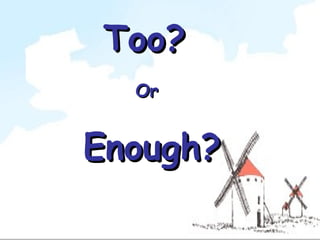Too or enough
•Als PPT, PDF herunterladen•
9 gefällt mir•9,824 views
Melden
Teilen
Melden
Teilen

Empfohlen
Weitere ähnliche Inhalte
Was ist angesagt?
Was ist angesagt? (20)
Used to, get used to be used to and would slideshare 

Used to, get used to be used to and would slideshare
Ähnlich wie Too or enough
Ähnlich wie Too or enough (20)
Mehr von Carmen Eugenia Maza Vergara
Mehr von Carmen Eugenia Maza Vergara (20)
Too or enough
- 2. Too / Enough? They are adverb of degree which tell us about the degree (how much) of an action, an adjective or another adverb. Common adverbs of degree: E.g. very, quite, too, enough ….
- 3. Too means more than necessary E.g. There are too many people on this train, there is nowhere to sit. E.g. You have too much money, donate some to the charity, please.
- 4. Too ≠ Very too = more than enough, more than necessary or more than wanted E.g. It was very cold, but we went out. E.g. It was too cold to go out, so we stayed at home.
- 5. Enough enough means "sufficient" E.g. Your clothes are big enough to fit me. E.g. Have you got enough money to buy that coat?
- 6. Enough in a negative sentence, means "less than sufficient" or "less than necessary" E.g. Sorry, I haven't got enough food for everyone E.g. He is not tall enough to be a policeman.
- 7. Enough usually follows its adjective E.g. He is not tall enough to be a policeman. E.g. He is not enough tall to be a policeman.
- 8. The End
